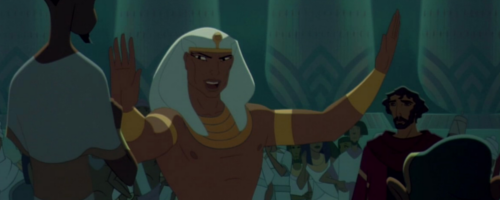ENTJ, The Commander, The Field-Marshall, The Trailblazer
Rameses is a pretty classic ENTJ movie villain, fulfilling all the traits that the movies need out of their ENTJs—ambitious, relentless, intelligent, and lacking remorse. He’s not a terribly good person to write about for a post coming out on Christmas Eve. If it helps, you can go back and read about a more healthy and loveable ENTJ, the Scarecrow from The Wizard of Oz. You can also re-read the first entries of this Prince of Egypt series, beginning with Moses—who happens to be Rameses’ mirror, reversing his letters (ISFP) and flipping the order of his cognitive functions.
No wonder these two clashed.
Dominant Function: Te/Extraverted Thinking, “Organize the Experience”
 Rameses is in it to win. Even in a boyish, just-for-fun chariot race, he reminds his younger brother of their hierarchy: “Second born! Second best!” He blames Moses for always getting him into trouble and making him look bad.
Rameses is in it to win. Even in a boyish, just-for-fun chariot race, he reminds his younger brother of their hierarchy: “Second born! Second best!” He blames Moses for always getting him into trouble and making him look bad.
He bristles at his father’s criticism that he’s foolish and irresponsible. Given new responsibility, Rameses takes charge of constructing a new temple and builds it bigger and better. He finds great pleasure in his accomplishments.
When Moses kills a slave master, Rameses offers to make it so that it never happened. “I am the morning and the evening star!” he recites. “If I say it, it will be done!”
Many years later, when Moses returns, Rameses has built up the kingdom of Egypt to great heights. His father’s criticism stings him even later in life, though, welling up when Rameses shouts that he will not be the weak link. He fears failure.
He’s not about to bend his will to Moses’ newfound God, either. Like his father before him, he sees the Hebrew slaves as nothing more than a means to an end. He increases their workload in response to Moses’ plea for freedom, and looks to the priests to disprove his brother’s “tricks.” It takes the battering of the Ten Plagues for him to change his mind, and even then, it’s more of an emotional decision.
Once the Hebrews have left, Rameses pulls it back together and leads his army against them.
It does not go as planned. Continue reading
